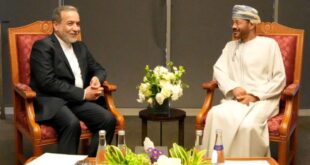 TEHRAN (FNA)- The Bush administration is still considering setting up a diplomatic outpost in Iran, US Secretary of State Condoleezza Rice said on Sunday.
TEHRAN (FNA)- The Bush administration is still considering setting up a diplomatic outpost in Iran, US Secretary of State Condoleezza Rice said on Sunday.
Her comments appeared to contradict an Associated Press report that the administration, in its waning months in office, had shelved plans to open an “interest section” in Iran.
“We continue to look at the idea, think it’s an interesting idea,” Rice told reporters who asked about a possible US interest section in Tehran.
When asked again if there is still a chance such an interests section could be set up before President George W. Bush leaves office in January, Rice replied, “We’re still looking at the idea.”
US officials stress that a US interests section had always been considered in the context of improving contacts between the American and Iranian people rather that between the two governments.
Such a mission would not mark a move to restore diplomatic relations.
Similarly, Rice reminded journalists in July that the presence of the US interests section in Cuba did not indicate a thaw in relations between the United States and the communist island nation.
“We are always looking for ways to relate to the Iranian people to make it easier for them to relate to us, but we’re still having that set of discussions,” Rice told reporters at the time.
The United States and Iran broke diplomatic relations in April 1980, after Iranian students seized the United States’ espionage center at its embassy in the heart of Tehran. The two countries have had tense relations ever since.
With China, Russia, France, Britain and Germany, the United States has spearheaded the imposition of three sets of UN Security Council sanctions on Iran for its refusal to give up the right of uranium enrichment enshrined for all signatories to the Non-Proliferation Treaty (NPT).
The United States and its Western allies accuse Iran of trying to develop nuclear weapons under the cover of a civilian nuclear program, while they have never presented any corroborative document to substantiate their allegations. Iran denies the charges and insists that its nuclear program is for peaceful purposes only.
Tehran stresses that the country has always pursued a civilian path to provide power to the growing number of Iranian population, whose fossil fuel would eventually run dry.
Iran is under three rounds of UN Security Council sanctions for turning down West’s calls to give up its right of uranium enrichment, saying the demand is politically tainted and illogical.
Iran has so far ruled out halting or limiting its nuclear work in exchange for trade and other incentives, saying that renouncing its rights under the NPT would encourage world powers to put further pressure on the country and would not lead to a change in the West’s hardline stance on Tehran.
Iran insists that it has to continue enriching uranium because it needs to provide fuel to a 300-megawatt light-water reactor it is building in the southwestern town of Darkhoveyn as well as its first nuclear power plant in the southern port city of Bushehr.
Tehran has repeatedly said that it considers its nuclear case closed as it has come clean of IAEA’s questions and suspicions about its past nuclear activities.
 Eurasia Press & News
Eurasia Press & News



